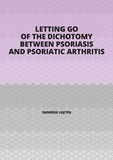Letting go of the dichotomy between psoriasis and psoriatic arthritis
Summary
Psoriasis is a very common auto-immune disease of the skin. Roughly 20% of patients with psoriasis also develop a rheumatic disease called psoriatic arthritis (PsA). While PsA has a negative influence on the lives of patients affected, there is much about the disease that we do not understand. This thesis describes ways in which to help clinicians detect PsA symptoms earlier, what they can expect from treatment, and a search for the biological mechanisms behind PsA using novel laboratory techniques.
A simple screening questionnaire was found to help identify psoriasis patients with PsA attending the dermatology clinic. Using this questionnaire may facilitate patient-centered collaboration between dermatologists and rheumatologists. Our research findings endorse the use of methotrexate as important treatment option for psoriatic arthritis, but also show that treatment failure is commonly caused by side-effects, which deserves more research attention in the future.
To better understand the cause of the disease, we studied patients’ immune systems in great detail. We detected major immune system disturbances in the blood of both patients with psoriasis and PsA, but little difference between the two groups. We did identify specific immune cells in skin and joint that we think contribute to the transition from psoriasis to PsA. Our combined results indicate that future studies should focus on skin and joint samples, rather than on blood samples.
Lastly, we make specific recommendations for improving the design of clinical trials in PsA, with the aim of making study results more applicable to daily clinical practice.
